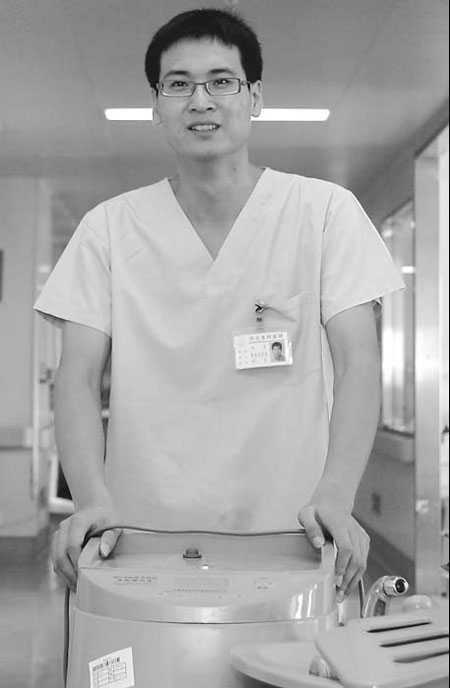Man finds meaning as a nurse with own advantages
Updated: 2011-10-06 08:03
By Liu Zhihua (China Daily)
|
|||||||||||
|
Liu Bao hopes for more understanding. Feng Yongbin / China Daily |
Calmness and strength held at emergencies prove helpful for patients
BEIJING - If you traveled back in time back to 2003, met Liu Bao in Baoding, Hebei province, and told him that someday he would be a nurse he would have looked at you in disbelief.
"I never thought I would be a male nurse at that time," Liu said. "Even now, 'male nurse' sounds novel to many people."
The 27-year-old has been working in the intensive care unit (ICU) at China-Japan Friendship Hospital in Beijing for four years. The unit has 40 nurses, but only four are men.
Every day at 8 am all the doctors and nurses gather in a meeting room for a briefing on every patient in the unit. Then, the head nurse will update work assignments and requirements.
There are two kinds of patients in the unit: those who have just undergone big operations and those who are very old and struggling in their last days. The patients' conditions are so critical that they can hardly take care of themselves.
Thus, the nurses' work is part medical care, part basic daily care.
Every day, apart from taking care of shots and medicine, regular checks of monitoring equipment and taking notes, nurses must regularly wash patients' bodies. Usually, the feet, torso and limbs are washed once every day, and hair twice a week.
Nurses must also help the patients turn over or change positions in bed every two hours to prevent bedsores.
"A nurse's work is important and painstakingly organized," said Li Gang, director of the unit. "A male nurse has his own advantages."
Male nurses tended to be much calmer in emergencies and be physically stronger, Li said, adding that in the ICU calmness and strength were a great advantage.
Liu wins praise for his ability and attitude. His colleagues see him as agreeable, and patients and their families believe him trustworthy.
He said he is happy in his job, but this has not always been the case. "It was hard to wash patients' feet at the beginning," Liu said. "It felt strange to wash other peoples' feet, let alone someone you hardly knew. I had never even washed my parents' feet."
In time, however, Liu overcame his discomfort and was able to perform such tasks.
Another challenge came when he realized he had to wash the bodies of female patients.
"It was embarrassing at first, both to me and to the patients," Liu said.
"Now when some female patients refuse to let me do the work, I will persuade them that what I do is required by the job and is good for them, and there is nothing personal or anything to be ashamed about."
Because most of the patients are very old, many even in their 80s, Liu and his colleagues address them as "grandpa" or "grandma" instead of by the patient numbers.
"I need to take good care of my patients," he said. "That's my job."
In 2003, after an undesirable performance in the national college entrance exams and unwilling to repeat the last year of high school, Liu enrolled in Tianjin Medical University's nursing college.
He did not know much about his new major, but one reason for his decision was he was told male nurses were urgently needed and he would find a good job after graduating.
There were 82 women in the program and nine men, and sometimes he felt strange, Liu said.
When he graduated in 2007, a hospital in Baoding offered him a position on the condition he complete a 10-month internship. Even though he wanted to work in his hometown, he turned it down.
"The salary was too low," he said. "It was only 500 yuan (then about $65) a month."
With help of job websites, he got an interview with the China-Japan Friendship Hospital and was recruited. He was told that the hospital preferred Beijing natives, but his gender made him a desirable candidate.
China's healthcare system urgently needs male nurses, but due to the social stereotype that the job is not fit for men, there are few. Figures from the Ministry of Health show that China had 2.18 million nurses by May last year, but there were only 21,000 males nurses, about 1 percent of the total.
Of Liu's eight male classmates, only one is working in a hospital as he does.
"Sometimes it looks like it was arranged by fate," Liu said. "I wanted to be a doctor and I wanted to work near home. Now I'm in Beijing and am a nurse.
"But I like my job, and I hope people will understand male nurses more."
China Daily
(China Daily 10/06/2011 page5)












